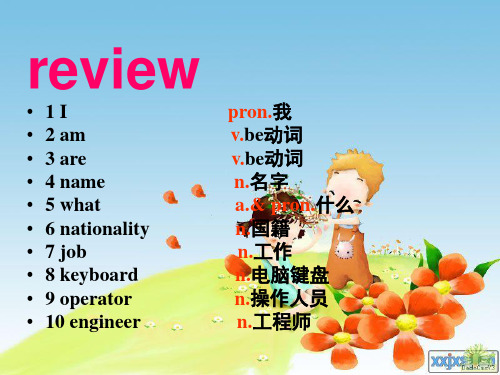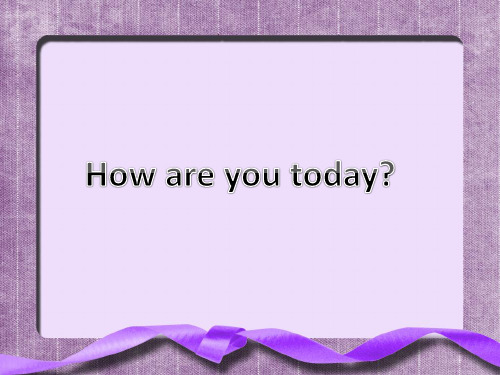新概念英语第一册第九课Lesson9
新概念英语第一册 Lesson9-10 How are you today?

review
• • • • • • • • • • 1 policeman 2 policewoman 3 taxi driver 4 air hostess 5 postman 6 nurse 7 mechanic 8 hairdresser 9 housewife 10 milkman n.警察 n.女警察 出租汽车司机 空中小姐 n.邮递员 n.护士 n.机械师 n.理发师 n.家庭妇女 n.送牛奶的人
cold [kəuld] 冷的
hot dog 热狗
I’m very hot. 我很热。 I’m very cold. 我很冷。 It is very hot. 天很热。 It’s very cold. 天很冷。
young [jʌŋ] 年轻的
old [əuld] 年老的,旧的
new [nju:] 新的
1.用于朋友或相识的人之间的寒暄话
本课知识点
代词
代词的定义:
代词是一种能代 替名词、形容词 或数词的词。
代词分类
Which kind of pronouns is it?
人称代词 (Personal Pronouns) 物主代词 (Possessive Pronoun) 反身代词 (Reflexive Pronouns) 指示代词 (Demonstrative Pronouns)
review
• 1.What's your name? • What's his/her name? • 回答:My/His/Her name is.... • 2.What nationality are you? • 回答:I'm+国籍 • 3.What's your job? • 回答:Iபைடு நூலகம்m+职业
新概念英语第一册Lesson910Howareyoutoday小学英语全国通用

Language Point
语句讲解、课文讲解
Steven (hot) Look at Steven! He's hot
Emma (cold) Look at Emma! She's cold.
Language Point
语句讲解、课文讲解
That milkman (old) Look at that milkman! He's old.
man的反义词。
Language Point
语句讲解、课文讲解
Look at that policeman! He's tall. Look at that policewoman! She's short. policeman : 男性警察 policewoman : 女性警察 tall : 长的 , 高的 short : 短的 , 矮的
查看答案解析
答案:policewoman 解析: 考查词义 policewoman n. 女警察;女警官;
语句讲解、课文讲解
同学们 , 请对照教材听老师讲解!
How are you today?
同学们 , 请做一下课堂笔记。
Language Point
语句讲解、课文讲解
how : 疑问副词,怎么样 what : 什么 e.g. What is your name? 你叫什么名字? —How are you? —I'm fine, thank you. / Fine, thank you.
Emma is very well. 艾玛很好。
Vocabulary
词汇精讲
today
adv. 今天
o : 不发 [o] 而发 [ə] 做副词 , 表示今天 e.g. I am late today. 我今天迟到了。 today作副词时 , 句中位置灵活 Today I am late. > I 始终大写
新概念英语第一册第9-10课课件

B: Not so good . 不是很好。
Not bad.
一般般。
Pretty good. 挺好的。
Great.
非常好。
Couldn’t be better. 再好不过了。
How is Tony? He is fine .
How are you? I’m well. I am well.
A How are you How is he ?
怎样 今天 身体好 美好的 再见 看见,见到
New words
h_ow t_oday w_ell f_i ne g_o o_dby_e s_e _e
怎样 今天 身体好 美好的 再见 见
Listening and answer
How is Emma? She’s very well.
:
Steven: Hello, Helen. Helen: Hi, Steven.
C. That’s all right
A. am
B. is
C. are
二、改写句子。 下面的句子是一组对话,但是顺序被打乱了。请你
C. yours
A. Look
B. Look at
C. See
C ( ) 6. Please ___ the picture.
AA. look
B. look at
( ) 7. I can’t ___ the book.
C. see
A. see
B. read
B( ) 8. I want to ___ the film.
Nice to see you , too ,
Steven .Goodbye .
= See you later.=See you. =See you around.
新概念英语第九课原文

新概念英语第九课原文New Concept English Lesson 9Part 1: The TextA man called Charles Osborne holds the world record for the longest time spent hiccupping. His hiccups began in 1922 and continued until 1990, a total of 68 years! Osborne's hiccups started after he had a heavy meal, and they just never stopped. Although his hiccups were not painful, they did cause him great inconvenience. He was unable to sleep properly and found it difficult to eat or drink. Despite this, Osborne managed to lead a normal life. He got married, had eight children, and even worked as a farmer and a carpenter. In 1990, however, his hiccups suddenly stopped, and he was able to enjoy a hiccup-free life until his death in 1991.Part 2: Vocabulary and Phrases1. hiccup (n): a sudden, involuntary contraction of the diaphragm muscle2. record (n): the best or highest achievement in a particular activity3. heavy (adj): large in amount, size, or degree4. inconvenience (n): trouble or difficulty caused to someone5. properly (adv): correctly or in the right way6. carpenter (n): a person who makes and repairs wooden objects and structuresPart 3: Comprehension Questions1. How long did Charles Osborne's hiccups last?2. What caused Osborne's hiccups?3. How did his hiccups affect his daily life?4. When did Osborne's hiccups finally stop?Part 4: Language Points1. "His hiccups began in 1922 and continued until 1990."- The verb "began" is in the past simple tense, indicating the start of an action in the past.- The verb "continued" is in the past simple tense, indicating the ongoing nature of an action in the past.2. "Although his hiccups were not painful, they did cause him great inconvenience."- The conjunction "although" introduces a contrast between two ideas.- The verb "were" is in the past simple tense, indicating the state of something in the past.- The verb "did cause" is in the past simple tense, indicating the cause and effect relationship between two actions in the past.3. "He was unable to sleep properly and found it difficult to eat or drink."- The verb "was" is in the past simple tense, indicating the state of someone in the past.- The verb "found" is in the past simple tense, indicating the discovery of a difficulty in the past.4. "In 1990, however, his hiccups suddenly stopped, and he was able to enjoy a hiccup-free life until his death in 1991."- The adverb "suddenly" describes the manner in which his hiccups stopped.- The verb "stopped" is in the past simple tense, indicating the end of an action in the past.- The verb "was able to enjoy" is in the past simple tense, indicating the ability to experience something in the past.Part 5: Discussion Questions1. Have you ever experienced hiccups? How did you get rid of them?2. Can you think of any other long-lasting medical conditions that people have experienced?3. How do you think Charles Osborne managed to lead a normal life despite his hiccups?4. Do you know any interesting records or achievements held by individuals?Conclusion:Charles Osborne's 68-year-long hiccups were a remarkable medical phenomenon. Despite the inconvenience they caused, he managed to live afulfilling life. His story serves as a reminder of the resilience of the human spirit in the face of adversity.。
新概念英语第一册第9课课件

Sophia
Words and expressions
fat
thin
tall short
clean
dirty
hot
cold
olExercise
Listen and tell the number of the word. 1fat 2thin 3tall 4short 5dirty 6.clean 7.hot 8.cold 9.old 10.young 11.busy
T:How……? S:How is Steven?
THANKS!
数
Comprehension
T:What’s her name?
S:Helen T:How is Helen?
S:She is very well.
Asking and answering questions
1 T: Ask me if Steven is well today. S:Is Steven well today?
zy 13.see 14.Well 15.How 16fine 17goodbye 18today 19hello 20thanks
A story about greeting…
Story time
Watch the video and answer:
How is Emma?
Listening and imitation
二、Greetings. Hello ! Hi ! Good morning ! Good evening !
Good afternoon !
How are you ?
How do you do !
Nice to meet you ! Glad to meet you !
新概念英语第一册第九课Lesson9

How is Tony? He's fine, thanks. How's Emma? She's very well, too, Helen.
New words:
fat
adj.胖的
woman n.女人
thin adj.瘦的
tall adj.高的
short adj.矮的
dirty adj.脏的
clean adj.干净的 hot adj.热的 cold adj.冷的 old adj.老的 young adj.年轻的 busy adj.忙的 lazy adj.懒的
她也很好,海伦。
Goodbye,Helen.再见,海伦。 Nice to see you.见到你真高兴。
H: Nice to see you, too, Steven.我见到你也很高兴,史
蒂文。
Goodbye.再见。
Language points语言点
How are you today? I'm very well, thank you. And you? I'm fine, thanks.
Lesson 9.
How are you today?
Key words:
today adv.今天 well adj.身体好的 fine adj.美好的 thanks int.谢谢 see v.看见
Text课文
S: Hello, Helen.你好,海伦
H: Hi, Steven.你好,史蒂文
S: How are you today?你今天好吗?
H: I'm very well, thank you. And you? 很好,谢谢你。你好吗?
S: I'm fine, thanks. 很好,谢
新概念英语第一册 Lesson9

13. 它是一本绿色的书还是一本红色的书? 它不是 绿色的书,它是红色的书。(green, red)
?
×
×
×
?
Emma很好。
Emma is fine. / Emma is well.
我是学生 她是老师 他是警察 你(你们)是邮递员 Tony 是工程师 它是绿色的 他(她)们是空姐 我们是医生
我是学生 她是老师 他是警察 Tony 是工程师 它是绿色的
你是邮递员
他(她)们是空姐 我们是医生
I am a student. She is a teacher. He is a police. Tony is an engineer. It is green.
Nice to meet you= nice to see you.
S: Hello, Helen. H: Hi, Steven.
S: How are you today? H: I’m very well, thank you. And you? S: I’m fine, thanks.
S: How is Tony?
What’s your job? I’m a teacher. What’s his job? He is a police.
Are you a police? Yes, I am. / No, I’m not. I’m a police.
What nationality are you? I’m Italian.
Tony 好吗? Emma 好吗?
How is Tony?
How is Emma?
2. I’m fine. / I’ m well.
他很好。
He’s fine. / He’s well. She’s fine. / She’s well.
新概念英语第一册lesson 9-10

HELEN:
Hi, Steven.
STEVEN:
How are you today?
HELEN:
I'm very well, thank
you. And you?
STEVEN:
I'm fine, thanks.
How is Tony?
HELEN:
He's fine, thanks.
How's Emma?
What’s Tom like? He’s very fat. 3、英语中形容词作定语时一般置于名词之前。
Lesson 10 Look at…
fat/fæ t/ 胖的 Look at that man. He is fat.
woman ['wJmən]女人 复数 women
thin [θIn]瘦的 Look at that woman. She is thin.
史蒂文:再见,海伦。见到你真 高兴。 海 伦:我见到你也很高兴,史 蒂文。再见。
我来讲故事
情景替换:
Rose: 你好,Jack。 Jack: 你好,Rose. Rose: 你今天好吗? Jack: 很好。谢谢你。你好吗? Rose: 很好,谢谢。 Jack: 你爸爸好吗? Rose:他很好,谢谢。你妈妈呢? Jack: 她也很好。 Rose:再见,Jack.见到你很高兴。 Jack:我见到你也很高兴,Rose. 再见。
Rose: Hello,Jack。 Jack: Hi,Rose. Rose: How are you today? Jack: Fine,thank you. And you? Rose: I’m very well, thanks. Jack: How is your father? Rose:He is fine,thanks.
- 1、下载文档前请自行甄别文档内容的完整性,平台不提供额外的编辑、内容补充、找答案等附加服务。
- 2、"仅部分预览"的文档,不可在线预览部分如存在完整性等问题,可反馈申请退款(可完整预览的文档不适用该条件!)。
- 3、如文档侵犯您的权益,请联系客服反馈,我们会尽快为您处理(人工客服工作时间:9:00-18:30)。
How is Tony? He's fine, thanks. How's Emma? She's very well, too, Helen.
New words:
fat
adj.胖的
woman n.女人
thin adj.瘦的
tall adj.高的
short adj.矮的
dirty adj.脏的
clean adj.干净的 hot adj.热的 cold adj.冷的 old adj.老的 young adj.年轻的 busy adj.忙的 lazy adj.懒的
Lesson 9.
How are you today?
Key words:
today adv.今天 well adj.身体好的 fine adj.美好的 thanks int.谢谢 see v.看见
Text课文
S: Hello, Helen.你好,海伦
H: Hi, Steven.你好,史蒂文
S: How are you today?你今天好吗?
她也很好,海伦。
Goodbye,Helen.再见,海伦。 Nice to see you.见到你真高兴。
H: Nice to see you, too, Steven.我见到你也很高兴,史
蒂文。
G are you today? I'm very well, thank you. And you? I'm fine, thanks.
Bye bye
H: I'm very well, thank you. And you? 很好,谢谢你。你好吗?
S: I'm fine, thanks. 很好,谢
谢。
How is Tony?托尼好吗? H: He's fine, thanks. 他很好,
谢谢。
How's Emma?埃玛好吗?
S: She's very well, too, Helen.
